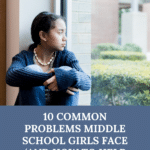Inside this post

I don’t know what it is about it, but middle school is the worst.
I mean, I did not enjoy it when I was a middle schooler myself back in the 80s, and from my own personal perspective, it was my least favorite time with my kids.
It wasn’t the education part of it. We had fantastic teachers and I watched my kids grow academically.
But the drama. O.M.G. the drama.
Everything just seemed so much!
I thought it was just me, but my highly unscientific polling data says otherwise. Middle school is tough for everyone.
I mean, even science backs me up. Research from Arizona State University found that mothers of middle-school children, between 12 and 14 years, were most stressed and depressed, while mothers of infants and adults had better well-being.
I feel this in my bones because I had three daughters in middle school at the same time. That was a lot of hormones and puberty and drama in my house.
Needless to say, I wasn’t sad to see middle school end. High school comes with it’s own issues, but I felt like I could manage it a bit better.
But, even though I complained (a lot) about middle school, I think my kids had it pretty hard too. There was a lot of changing dynamics for them, and while they came out the better for it, the process wasn’t entirely enjoyable, and sometimes, it downright sucked.
What helped?
In our home, it came down to three things:
- Boundaries: having clear boundaries on everything from screen time and privileges to behavior and school work. We outlined it all for them. They were flexible depending on the situation, but everyone being on the same page helped.
- Compassion instead of empathy: I cannot even fathom what it’s like to be a middle schooler in today’s complex world. When their emotions were big, I didn’t try to understand them from their point of view, I simply accepted them as valid and listened. This was hard but a game-changer.
- Taking a step back. One of my daughter’s often came at me verbally with a wrath I was not prepared for. This disrespect was unexpected and out of nowhere. When I dug deeper, I discovered she was transferring her feelings about something going on at school to me. It both broke my heart and made me see things a lot clearer. I was able to disengage from this sort of behavior with her, not take it personally, and then when she was ready, engage in a more healthy way. I think this literally saved our relationship from deteriorating (thanks to a great therapist friend for this tip!)
While it may seem to us that all our tween daughters have to worry about are locker school combinations and a geography test, the truth is, there’s a lot more on their minds. But as time goes on, their worries and problems evolved too.
Ten problems middle school girls face
1. Fear of disappointing others
The middle school years are when young girls, in particular, start becoming more focused on their peers, which often strains friendships (and can lead to loads of drama). Some girls find their voice, while others become too compliant, often at the expense of their own wants and needs. This can lead them into the role of a people pleaser and develop a fear of disappointing others. This can result in a few problematic scenarios, including becoming a target of bullies, perfectionism, and being more susceptible to peer pressure and other risky behavior.
Often people pleasing is so deeply ingrained that your tween probably doesn’t even know they are doing it. It literally becomes a part of their personality. Parents can help coach their kids through situations by helping their kids understand their wants, needs, and emotions. Young people need to comprehend that it is okay to address their own self-care and that they are responsible for themselves.
You may also like to read: Dear Daughter: You Are More Than a People Pleaser
2. Middle School Popularity
By the end of 5th grade, the playground shifts from unstructured play to more complex group dynamics and hierarchy. This is when popularity becomes front and center in middle school.
A study by Kathryn LaFontana and Antonius Cillessen found that less than 10% of children in grades 1st – 4th grades consider popularity more important than friendship. That percentage more than doubles as kids begin middle school. Over 25% of 5th – 8th graders consider popularity more important than friendships. Not all kids want to be popular, but they need to figure out how to navigate peers and status. Preteens are working on figuring out who they are outside their family, so peer status matters.
Concern over acceptance, rejection and popularity is at a maximum level for kids and their parents during middle school and early high school – a time when social instability rules. Through ongoing conversations, caregivers can help their kids increase their social awareness and foster skills that support healthy relationships. This includes listening without judgment, broadening their perspective to understand the important qualities of people, developing social/friendship skills, and modeling solid relationships.
3. Social media
While I’m a big fan of the Wait til 8th campaign on phone usage and social media, this does not mean that your child will remain unscathed from the plagues of Instagram, SnapChat, and the other platforms during middle school even if they don’t have an account. Many parents are not aligned in this area, so even if your kid doesn’t have a phone or social media, that doesn’t mean that they can’t be scrolling on someone else’s device (or sneaking around on one of their own.)
However, we do know that social media use correlates to higher levels of depression, anxiety, and loneliness in tweens and teens. Period.
The problem lies with the fact that parents are not often equipped to deal with the problems social media presents. For example, a middle school girl scrolling through Instagram discovers that she’s been left out of a friend’s party. She becomes understandably upset and looks to her parents for advice. Situations like this may be common, but that doesn’t mean that the adults will always know just what to say.
Some kids seem more keen to connect online than others, particularly if you have older siblings in the house. While technically, tweens should not be on social media at all (the legal age is 13), parents must take the time to set boundaries, talk about risk, and teach their kids how to use it properly. Parents need to remember that our kids are not growing up like we did, and it’s our responsibility to help them navigate a world full of screens.
You may find these posts useful:
Why You Shouldn’t Let Your Middle School Kids Have Social Media
Tired of Yelling at Your Teen to Get Off Their Phone? Try This Trick Instead
Here Are The Tech Rules You Need To Be Setting For Your Tweens and Teens
4. Managing friendships
Sometimes attending middle school can be like walking through a mine field. Friendships that were once simple can be come increasingly complex. New interests, mean girls, an influx of students from different schools, changing classrooms, and hormonal fluctuations can wreak havoc on what were once stable relationships.
Middle school is a time when parents should back away from engineering their child’s friendships, but that doesn’t mean they shouldn’t look for signs that there are problems. There are many ways caregivers can help coach their child through relationship problems, including encouraging them to participate in activities that help them meet new friends, bonding over similar interests, or investing more deeply in current friendships. The end-goal is to help your tween learn how to identify and nurture relationships that are healthy and productive–and that’s often something they need to discover on their own.
You may also like to read: How to Help Your Teen Identify and Manage a Toxic Friendship
5. Academic success and stress
Middle school is often the time when grades start becoming more important, and often the first time kids get segmented into different groups. A pre-teen student may experience stressors such as homework load, achieving certain grades, managing a busier schedule, test anxiety, grades, tougher courses, and more.
Chessie Shaw, Ed.M.’98, a counselor in Massachusetts, sees the anxiety at her middle school, especially once girls reach seventh grade. “Seventh grade is when I have seen some girls start to question their academic abilities and intelligence. This is especially true in math and science. It’s also when a lot of anxiety and self-harm behaviors come to light,” she says. For example, “I definitely see the most cutting in seventh grade. It’s often around feeling that they aren’t doing well enough in school or that they aren’t ‘good enough’ in some way.” By the end of eighth, some girls regain their confidence…”
Parents of young girls need to ensure that their self-esteem does not get intertwined with their grades or academic progress (or any achievement.) Because young teens often long for their parent’s approval, it’s essential for moms and dads to reward and praise effort and not achievement. In a world where adolescents are getting bombarded with negative messaging, positive reinforcement on things they can control is critically important. It is also an excellent time to encourage your daughter to build relationships with their teachers and ask for help when they need it.
6. Body image
One of the reasons I hated middle school back in the stone age was because I felt completely out of control in my body. Hair was growing in weird places, zits were appearing, I was growing and filling out, and I had a really bad spiral perm (thanks, Mom.) Not much has changed today, although as mothers, we often do a better job of helping our tween girls look a little less awkward.
Even with that, body image is a major problem for middle school girls. It is a time when our daughters are thinking they are too tall, too round, too flat, too pimply, or too much. Unrealistic photos are shoved into their view at every juncture, and filters become the norm. It is a time when their self-esteem often plummets, and a feeling of awkwardness never goes away.
Parents need to be extremely aware of their language when talking about appearance (both their own and others), food, exercise and healthy living, as well as modeling positive behaviors. It’s important to discuss the messages their kids receive from the media and how technology like filters and photoshop work. This also may be an excellent time to use some empathy on how middle school is often a transition time for everyone. I know showing my three daughters my photos from middle school gave us all a good laugh, and provided a little hope that my bad perm eventually grew out!
It also is a good time to go over hygiene habits, such as taking a regular shower, deoderant, teeth brushing, etc. Sometimes tweens don’t deem these tasks important, but they are a part of developing a healthy body image. Feeling good (and clean) is half the battle.
You may also like to read: How To Keep Puberty From Killing Your Tween Girl’s Confidence
7. Perfectionism
The 2018 Ypulse Confidence Code poll found that more than half of teen girls feel pressure to be perfect, while three in four worry about failing. Between ages 12 and 13, the percentage of girls who say they’re “not allowed” to fail increases by a staggering 150 percent.
Ultimately, perfectionism can be a positive trait when it drives tweens and teens to strive for excellence and achieve their goals. However, it can also lead to negative consequences when it becomes all-consuming and interferes with our their well-being. In fact, the middle and high school years can be particularly brutal for perfectionists because adolescents are still developing their sense of self and may be more vulnerable to the pressure of societal expectations.
When a perfectionist is melting down and feels like they are inadequate, the last thing you want to do is tell them that their feelings are wrong. This only worsens matters because the young girl may feel unseen and unheard.
Instead, encourage your tween to focus on effort and progress rather than perfection. Remind them that it is okay to make mistakes and that they can learn from them. Emphasize that the goal is to improve, not to be perfect. Helping your daughter develop a growth mindset by encouraging them to embrace challenges, learn from mistakes, and view failure as an opportunity for growth can be a game changer for them.
8. Standing out
While adolescent girls struggle to discover their authentic selves, they also stress about standing out in any way. Especially when it’s something outside of their control. This could mean being the tallest, struggling in school, having bright red hair, receiving too many accolades for academic success, developing acne, or anything that makes them feel different than their peers.
As parents, we must continue to focus on their strengths and provide our children with role models who embrace their differences.
9. Bullying
Bullying is a problem as old as time, but middle school students can be relentless. About 55% of middle schoolers say that bullying is a major problem among their peers, and about 20 percent of school students in the U.S. report they have been cyberbullied. Ongoing bullying and harassment can cause low self-esteem, mental health challenges, and increase the risk of self-harm and suicide.
Signs your tween may be getting bullied include:
- Headaches, stomachaches, tiredness, or poor eating habits
- Missing school, disliking school, or having decreased school performance than previously
- Self-destructive behaviors, such as running away from home or inflicting harm on oneself
- Thinking about suicide or attempting to commit suicide
- Unexplained injuries
- Lost or destroyed clothing, books, electronics, or jewelry
- Difficulty sleeping or frequent nightmares
- Sudden loss of friends or avoidance of social situations
According to StopBullying.gov: “It’s important to remember that many young people that are being bullied – or those who are bullying others- have difficulty seeking help. Those who are bullied may be embarrassed about what is happening, may be worried that the situation will get worse if they speak up, or may simply want to handle it on their own. If you believe a young person is being bullied, or is engaging in bullying behavior toward others, please do not delay in seeking help. Early intervention is critical in resolving the situation, empowering the young person who is being bullied, managing any emotional distress that is the result of experiencing bullying, and addressing the needs of a young person who may be bullying others.“
10. Managing emotions and self-esteem
What we know about puberty and adolescent brain development suggests that girls brains develop before boys, which could lead to why tween girls struggle with managing their emotions during the middle school years. One day, my youngest started getting teary after someone made an innocent comment about her messy bun. But I took things to a whole new level when I mistakenly said, “Hey, no biggy, but you’re going to be late if you don’t hurry it up.” Then I gently put a hand on her shoulder, at which point she turned and screamed at me: “I don’t know why I’m crying!”
Middle school girls’ hormones are basically like tennis balls being shot out of an automatic cannon at different speeds. They explode all these powerful feelings, making it impossible for anyone to handle them, resulting in crying, moodiness, and attitude fluctuations. How parents react to this can impact a young girl’s self-esteem.
Over 25% of 5th – 8th graders consider popularity more important than friendships. Not all kids want to be popular, but they need to figure out how to navigate peers and status. Preteens are working on figuring out who they are outside their family, so peer status matters.
While adolescent girls struggle to discover their authentic selves, they also stress about standing out in any way. Especially when it’s something outside of their control. This could
Adolescent girls need to understand that they are not losing their minds and that these powerful hormones fuel many of the intense emotions she’s experiencing. There will be fluctuations according to her cycle, so talk with your daughter about ways to manage her mood swings.
Are you struggling to establish the relationship you want with your adolescent child?
You may like this book by Parenting Teens & Tweens owner Whitney Fleming. You’re Not a Failure: My Teen Doesn’t Like Me Either can help you identify and manage your parenting growth areas to form a better connection with your child–and make you feel a little less alone in this challenging time.

You may also like this post: 9 Awesome Books to Help With Parenting During the Middle School Years
Raising tweens and teens is hard, but you don’t have to do it alone. Here are some other posts parents found helpful:
My Heart Broke When My Tween Was Picked Last, But the Lesson Was Gold
How Guided Meditation Helped Me Grow Closer to My Energetic Tween Son
10 Life Skills You Should Start Working on With Your Middle Schooler Today







Nicely put. Kudos! can someone write my essay affordable essay writer write a paragraph for me using these words